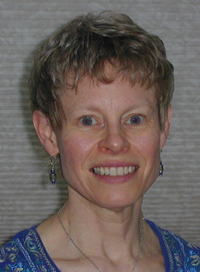Karen Wilson Scott, Ph.D.
Associate Professor of Human Resource Training & Development
Idaho State University
1784 Science Center Dr., MS 8150
Idaho Falls, ID 83402-8150
Phone: 208.282.7967 (O)
208.521.9793 (Cell)
Email: scotkare@isu.edu
Karen Wilson Scott, PhD, is an Associate Professor of Human Resource Training and Development at Idaho State University. Karen teaches principles and practices of facilitating adult learning, reframing issues in human resource development, and applied research practices. Karen is committed to building community as a reflective-collaborative learning environment in live, distance, and online courses. She is interested in the reflexive nature of learning in community, where individuals are collectively appreciated, and relevance is a primary focus. She works to advance the practice of metagogy, interdependent teaching and learning of individual committed to the furtherance of each individual while motivated by the growth of the learning community. Karen is interested in nurturing self-directed learning, specifically in exploring narratives that portray congruous autonomy, the pull of deep personal commitment to extraordinary involvement in a pursuit, particularly among those 50 years and older. She is interested in positive aging and how individuals pursue personal goals to develop their potentials as they define them at any age. Karen is Co-Editor of The Qualitative Report, http://www.nova.edu/ssss/QR/index.html, a free online international journal publishing creative, rigorous, and polished qualitative research across disciplines. As a Co-Editor, Karen guides authors to improve their manuscripts through a collaborative editing and review process that builds a positive learning community of author, editor, and reviewers as all contribute to the manuscript together.
Publications (With URLs Where Electronic):
Refereed/Adjudicated:
- Collaborative Self-Direction: Two Approaches – url – http://vawin.jmu.edu/vertex/article.php?v=1&i=1&a=4
- Goodwin, K.S., Ostrom, L.T., and Scott, K.W. (2009). Gender differences in mathematics self-efficacy and back substitution in multiple-choice assessment, Journal of Adult Education. [In Press].
- Hollingsworth, G.M., and Scott, K.W. (2008). Understanding a fragile life: The informal learning of a multiple kidney transplant recipient. International Journal of Self-Directed Learning, 5(1), 30-44, http://www.sdlglobal.com/docs/IJSDL/IJSDL_5.1-2008.pdf
- McCaslin, M.L., and Scott, K.W. (2003). Method for studying a human ecology: An adaptation of the grounded theory tradition. The Researcher, 17(1), 26-32.
- Scott, K.W. (2006). Self-directed learners’ concept of self as learner: Congruous autonomy. International Journal of Self-Directed Learning, 3(2), 1-13, http://www.sdlglobal.com/IJSDL/IJSDL%203.2-2006.pdf
- Scott, K.W. (2005). Abstract for Database: Relating the categories in grounded theory analysis: Using a conditional relationship guide and reflective coding matrix. (Published in The Qualitative Report, 9(1), pp. 112-126). CSA Sociological Abstracts Database. Retrieved August 27, 2005, from http://www.csa.com/author_relations/author_display.php?disp_num=0&SID=9ac85c4b3722999585b9a5280f4fa781
- Scott, K.W. (2004). Collaborative self-direction: Two approaches. Vertex: The Online Journal for Adult and Workforce Education, 1(1), http://vawin.jmu.edu/vertex/article.php?v=1&i=1&a=4.
- Scott, K.W. (2004). Congruous autonomy: The “pull” of personal commitment to extraordinary involvement in a pursuit. Journal of Adult Education, 33(1), 7-18.
- Scott, K.W. (2004). Relating the categories in grounded theory analysis: Using a conditional relationship guide and reflective coding matrix. The Qualitative Report, 9(1), 112-126, http://www.nova.edu/ssss/QR/QR9-1/index.html.
- Scott, K.W. (2003). Moving students from naïve theory to critical thought: Encouraging perseverance. Journal of Adult Education. 32(2), pp. 82-86.
- Scott, K.W., and Hollingsworth, G. M. (2009). Understanding a fragile life: The perceptions of a multiple kidney transplant recipient, Nephrology Nursing Journal. [In Press].
- Scott, K.W., and Howell, D.M. (2008). Clarifying analysis and interpretation in grounded theory: Using a conditional relationship guide and reflective coding matrix. International Journal of Qualitative Methods, 7(2), pp. 1-15, http://ejournals.library.ualberta.ca/index.php/IJQM/issue/view/282
- Scott, K.W., and McCaslin, M.L. (2003). The five-question method: Framing a qualitative research study. The Qualitative Report, 8(3), pp. 447-461, http://www.nova.edu/ssss/QR/QR8-3/index.html.
- Scott, K.W., McCaslin, M.L., and Alexander, G.C. (2003). The relevance of authorial presence in understanding qualitative writing. Teaching and Learning: The Journal of Natural Inquiry and Reflective Practice, 17(3), 105-112.
- Scott, K.W. (2002). High self-efficacy and perseverance in adults committed to new challenging life pursuits after age 50: A grounded theory study. Dissertations Abstract International, 63(04), 2101B. (UMI No. 3050223).
- Scott, K.W. (2002). Summary of high self-efficacy and perseverance in adults committed to new Challenging life pursuits after age 50: A grounded theory study. Phi Delta Kappa Outstanding Doctoral Dissertation Award Winners. http://www.pdkintl.org/edres/ddwin02.htm.

Karen Wilson Scott, Ph.D. Manuscripts
- The Five-Question Method for Framing a Qualitative Research Study (165.29 KB)
- Clarifying Analysis and Interpretation in Grounded Theory (483.07 KB)
- International Journal of Self-Directed Learning 2008 (548.75 KB)
- International Journal of Self-Directed Learning 2006 (1.24 MB)
- Gender Differences in Mathematics Self-Efficacy and Back Substitution in Multiple-Choice Assessment (116.01 KB)
- Relating Categories in Grounded Theory Analysis (124 KB)
